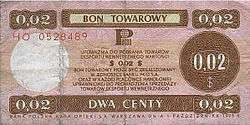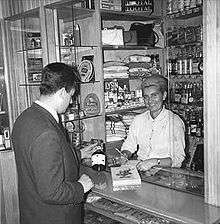Pewex
Pewex (short for Przedsiębiorstwo Eksportu Wewnętrznego - Internal Export Company) was a chain of hard currency shops in the People's Republic of Poland. They sold otherwise unobtainable Western goods in exchange for Western currencies, most commonly the United States dollar or Pekao bank checks.
History
By the late 1960s, it had become apparent that the then socialist centrally-planned economy of Poland was inefficient. The rule of Edward Gierek led to a short period of economic prosperity. With the aid of foreign loans, Gierek instituted a programme to modernise industry and increase the availability of consumer goods. The standard of living increased markedly and for a time he was hailed a miracle-worker. The economy, however, began to falter during the 1973 oil crisis and by 1976 price increases became necessary, mostly to ease the repayment of these loans.


In order to obtain the much needed foreign currency from Polish society, the authorities permitted in 1972 the creation of a network of shops under a state-owned bank named Pekao. There, the foreign hard currency could be exchanged for both foreign and domestic goods, many of which were unavailable to Poles at that time. Since ownership of hard currency as cash was forbidden and all dollars and Deutschmarks had to be deposited to dollar bank accounts, the authorities introduced Bon PeKaO cheques, which were tied to the U.S. Dollar in a 1:1 ratio and could be used as currency in Pekao shops. Later on the Pekao bank created a separate company, Przedsiębiorstwo Eksportu Wewnętrznego - the Pewex. While the letter x is not present in the Polish alphabet, it was used nevertheless, so that the name would sound somehow exotic and Western-like in the ears of the mostly pro-American society.
For years, the Pewex shops were the most common way for people in Poland to purchase unavailable consumer products. Pewex offered a large variety of products unavailable otherwise to the Polish population. These included jeans, Coca-Cola, alcohol, sweets, toys, cigarettes, electronics, and colour TV sets. In addition, Pewex offered a number of Polish-made products that were otherwise intended for export only, including vodka and Krakus ham (hence the name "internal export"). Moreover, the Pewex chain was very popular among foreign tourists and diplomats, who could buy Western articles at very reasonable prices (sometimes even as low as 40% of their cost in the West) and tax free.
During the 1980s' economic crisis, when the state-owned shops for ordinary people offered barely anything, the Pewex shops were sometimes the only places where one could buy basic foodstuffs and other basic articles like toilet paper. Finally, in the 1980s, Pewex shops became one of the very few places in Poland where cars and flats could be bought without having to wait for several years.
As part of the peaceful transition of the economic system in Poland after 1989's revolution in Poland, the Polish economy was privatised and the ownership of foreign currency was deregulated. This made the Pekao cheques obsolete and soon afterwards most of the goods that had only been available from Pewex stores started to be sold in private shops as well. In the mid-1990s, the chain was heavily mismanaged, eventually privatised but soon afterwards went bankrupt. The destruction of the Pewex brand, one of the most recognizable in the People's Republic of Poland, is considered a good example of brand mismanagement.
See also
Further reading
- Zlot a lot of dollars. (Pewex stores in Poland), The Economist, May, 1988
External links
- (Polish) Atlantyda Ludowa, czyli jak zmarnowano najlepszą markę PRL-u
- Ewa Cander-Karolewska, Painted advertisement for Pewex, 01.08.2007,